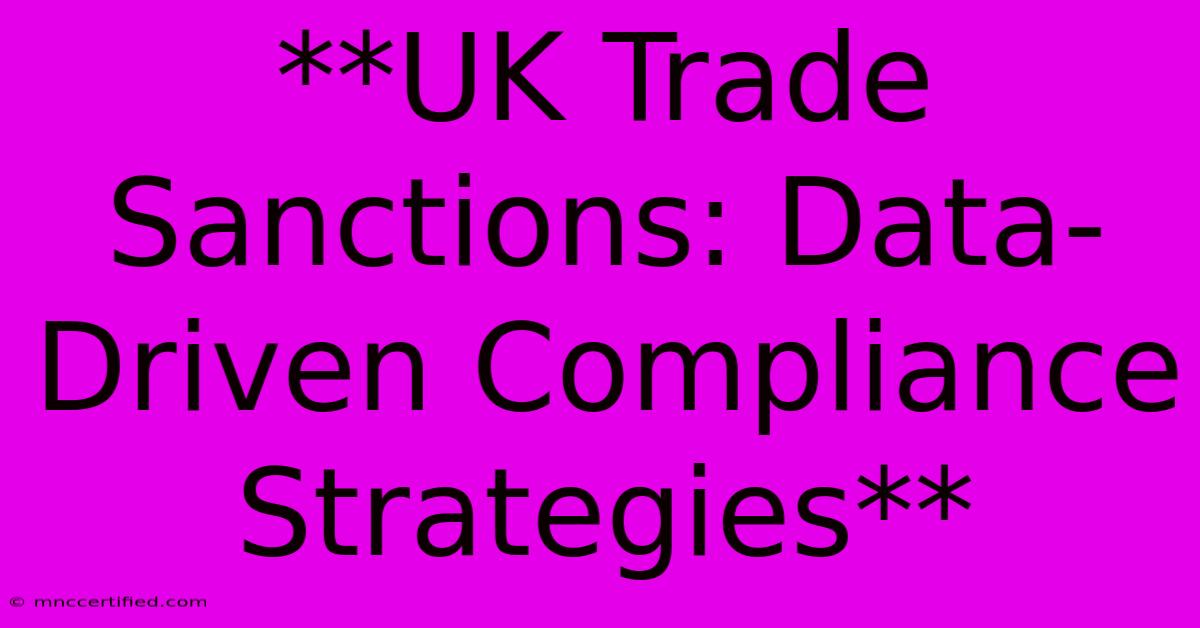**UK Trade Sanctions: Data-Driven Compliance Strategies**

Table of Contents
UK Trade Sanctions: Data-Driven Compliance Strategies
The UK's sanctions regime is constantly evolving, posing a significant challenge for businesses operating globally. Staying compliant with ever-changing regulations requires a proactive and data-driven approach. This article explores how businesses can leverage data analytics to navigate the complex landscape of UK trade sanctions and ensure compliance.
Understanding the UK Sanctions Landscape
The UK maintains a robust sanctions regime, aligned with international efforts to target individuals, entities, and countries engaged in activities deemed harmful to national security, international peace, or human rights. These sanctions can include:
- Asset freezes: Preventing individuals or entities from accessing their assets held within the UK.
- Trade bans: Prohibiting the import or export of specific goods or services to or from designated countries or individuals.
- Travel restrictions: Limiting travel to or from designated countries or individuals.
Staying ahead of the curve requires:
- Regularly monitoring: Keep abreast of the latest sanctions announcements and updates.
- Identifying: Understand which individuals, entities, or countries are subject to sanctions.
- Assessing: Evaluate the potential impact of sanctions on your business operations and supply chain.
Harnessing Data Analytics for Compliance
Data analytics plays a crucial role in navigating the complex web of sanctions regulations. Here's how:
1. Automated Screening & Due Diligence
- Customer data: Analyze customer data to identify individuals or entities that may be subject to sanctions.
- Transaction monitoring: Implement robust systems to detect and flag suspicious transactions involving sanctioned parties.
- Supplier screening: Verify your suppliers' compliance with sanctions regulations.
2. Risk Assessment & Mitigation
- Geopolitical intelligence: Utilize data from reputable sources to assess the potential impact of sanctions on your business operations in specific regions.
- Supply chain mapping: Map your supply chain to identify potential vulnerabilities and assess the risk of inadvertent involvement with sanctioned parties.
- Scenario planning: Develop contingency plans to mitigate the potential impact of sanctions on your business.
3. Reporting & Documentation
- Automated reporting: Generate comprehensive reports to track sanctions compliance activities and identify potential areas for improvement.
- Data-driven evidence: Utilize data analytics to provide evidence-based support for compliance decisions and audits.
The Benefits of a Data-Driven Approach
- Reduced risk of penalties: Proactive compliance minimizes the risk of fines and reputational damage.
- Improved operational efficiency: Automation and data analytics streamline compliance processes, saving time and resources.
- Enhanced business intelligence: Data insights provide valuable intelligence about geopolitical risks and market trends.
Finding the Right Solution
Several software solutions offer comprehensive sanctions screening and compliance management features. Consider factors like:
- Accuracy & coverage: Ensure the solution covers the latest sanctions lists and regulations.
- Integration with existing systems: Seamless integration with your existing CRM, ERP, and other systems for streamlined data flow.
- User-friendly interface: A user-friendly interface allows for easy navigation and data interpretation.
Conclusion
Navigating the complex world of UK trade sanctions demands a strategic approach. By leveraging data analytics, businesses can proactively mitigate risks, optimize compliance efforts, and ensure continued success in a globalized marketplace. A data-driven approach to sanctions compliance not only ensures legal compliance but also empowers businesses with the insights needed to navigate the ever-changing landscape of international trade.

Thank you for visiting our website wich cover about **UK Trade Sanctions: Data-Driven Compliance Strategies** . We hope the information provided has been useful to you. Feel free to contact us if you have any questions or need further assistance. See you next time and dont miss to bookmark.
Featured Posts
-
Does Umbrella Insurance Cover Workers Comp
Nov 07, 2024
-
Acceptance Insurance Full Coverage Policy
Nov 07, 2024
-
Maksimovic Aims To Outshine Yamal Vs Barca
Nov 07, 2024
-
Champions League Crvena Zvezda Vs Fc Barcelona Live
Nov 07, 2024
-
How To Get A Massage Covered By Insurance
Nov 07, 2024